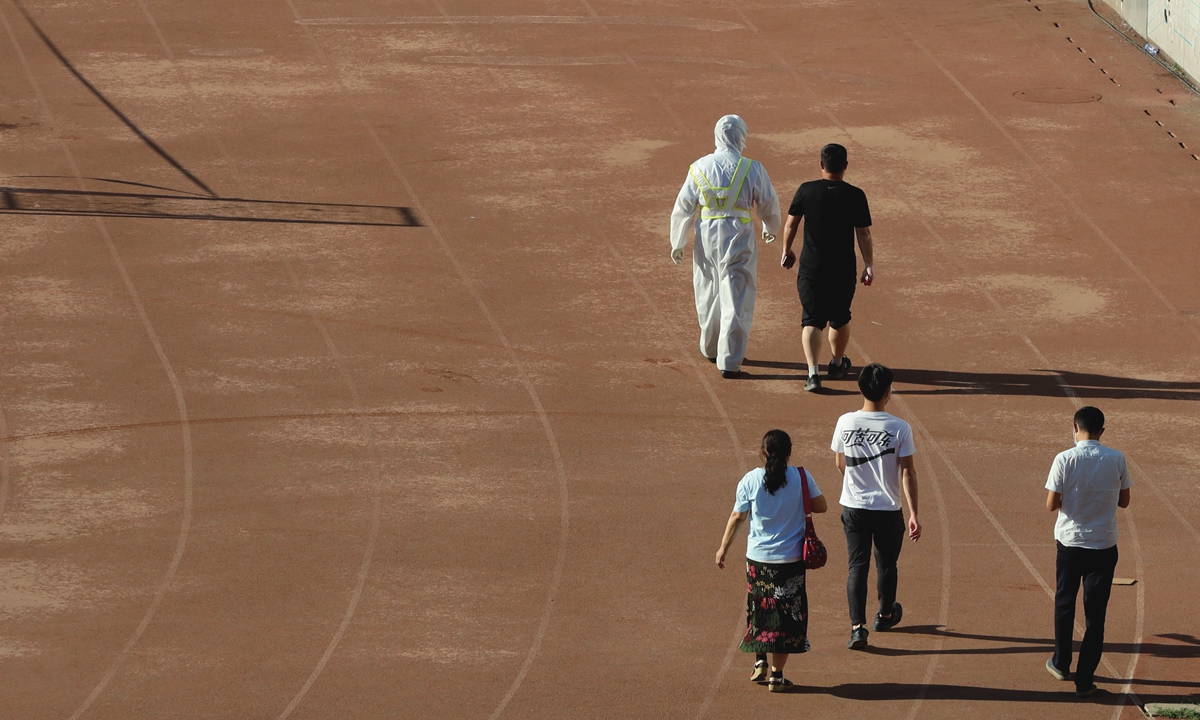Beijing turns into 'no-go zone' amid new cases, residents lower travel plans
By Zhao Yusha, Cao Siqi and Xu Keyue Source:Global Times Published: 2020/6/15 21:25:40

Residents follow a health worker to a testing station at a sports center in Xicheng district after Beijing municipal government demanded all residents who visited the Xinfadi food market since May 30 to undergo nucleic acid tests for possible infection with the novel coronavirus after the city reported 51 confirmed COVID-19 cases as of Sunday. Photo: Li Hao/GT
After Beijing sees COVID-19 infection spike, it seems that the capital has now become a "no-go zone" for other parts of China, as many places have raised alert to travels to Beijing and strengthened health check on arrivals from Beijing.
Meanwhile, after being locked in the capital for almost half a year, many Beijing residents yeaning for a vacation for the upcoming Dragon Boat Festival or summer travel season after the epidemic had ebbed away, only found that their travel plan would be disrupted by the sudden spike of local infections in Beijing. Some Beijing residents simply choose not to leave the city over fears of strict quarantine measures they may face in other places.
Experts believe that strict measures are reasonable, but they should not go too far as only certain areas were hit by the virus in Beijing, a city that is home to 21.5 million permanent residents. Moreover, the city's swift response to the spread of the virus has been comprehensive, so there's no need to panic, according to health professionals.
Three provinces - Northeast China's Liaoning, North China's Hebei and Southwest China's Sichuan - have reported more COVID-19 cases that had close contacts with infections in Beijing.
Beijing reported 36 new local confirmed cases on Sunday, bringing the total to 79 from Thursday. A further six asymptomatic patients were also reported on Sunday.
Hebei's health authority reported three more cases and one more asymptomatic case on Sunday, all of whom had close contacts with Beijing's cases. Baoding, a city in North China's Hebei Province, declared it was entering wartime status due to its geographic proximity with Beijing.
The Northeastern Chinese city of Daqing is imposing a 21-day quarantine for people returning there from Beijing, media reported on Monday.
Meanwhile, some Beijing residents are cancelling their travel plans for fear of being quarantined and stuck in places elsewhere.
Beijing resident Zhang Ziran cancelled her flight ticket to Central China's Hunan on Sunday, after seeing local infections soar and related infections found in other parts of China. "Although Beijing hasn't yet announced any travel restrictions, I am afraid I may undergo strict quarantine measures in Hunan," Zhang told the Global Times.
A government employee in Changsha, Hunan Province, told the Global Times that anyone travelling to Changsha from Beijing should first contact the local community of where they are planning to stay. Based on their situation, the Changsha community will then decide whether the traveler will be subject to quarantine.
"If the health code is green, the person can move around freely. If it's yellow or red, he (or she) will be quarantined for 14 days," said the employee.
A government employee from Jinan, capital of East China's Shandong Province, told the Global Times that even people from low-risk Beijing districts will only be allowed to stay in hotels after they have provided valid nucleic test results.
A Wuhan government official surnamed Wang told the Global Times that the city doesn't have specific quarantine rules for people travelling from Beijing, adding that "a green health code will be sufficient."
Many cities, such as Chongqing and Chengdu, have notified their residents to report anyone who has come from Beijing in the last 14 days.
An employee from the railway bureau of Taiyuan, North China's Shanxi Province, told the Global Times that the bureau issued a notice on Sunday suspending permits for its employees to travel to Beijing. If they need to go to Beijing for official or personal matters, they need to get an approval from the local disease control and prevention center and take a nucleic acid test after coming back.
The notice also requested employees who returned from Beijing in the last two weeks to report and take nucleic acid tests.
Governments in other cities, including Qianan in Hebei, Suzhou in East China's Jiangsu, and Liaoning Province issued notices over the weekend warning their residents not to travel to Beijing, unless it is necessary.
Wu Zunyou, chief epidemiologist at the Chinese Center for Disease Control and Prevention, told media on Monday that only certain parts of Beijing had been hit by the virus, so the rest of China should make a distinction between people from high risk and low risk parts of Beijing, adding that there is no need to put restrictions on those arriving from or living in low risk areas.
Wang Peiyu, deputy head of Peking University's School of Public Health, told the Global Times that a minor rebound of infections in a metropolis like Beijing is normal, and that the new infections were all directly or indirectly connected to Xinfadi market. Wang shrugged off the possibility of large-scale infections in the capital, saying that China has always made efforts to prevent lapses in safety.
RELATED ARTICLES:
Posted in: SOCIETY,FEATURE